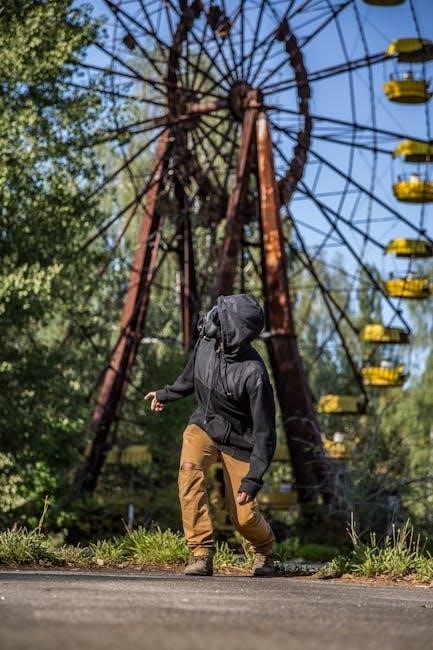Voices of Chernobyl PDF is a harrowing oral history by Nobel laureate Svetlana Alexievich, capturing the emotional and psychological impact of the 1986 Chernobyl disaster through personal testimonies.
Overview of the Book
Voices of Chernobyl PDF is a poignant oral history by Svetlana Alexievich, presenting personal accounts of survivors, firefighters, and evacuees affected by the 1986 Chernobyl disaster. The book captures the human cost, fear, and uncertainty through firsthand testimonies, offering a deeply emotional and raw perspective. Alexievich’s approach focuses on individual stories rather than statistics, creating a vivid tapestry of experiences. Published in 1997, the book has been translated into multiple languages and is recognized for its powerful narrative. It provides a unique insight into the tragedy, blending personal narratives with historical context, making it a vital document of one of the world’s worst nuclear disasters.
Importance of the Topic
The topic of Voices of Chernobyl PDF holds profound significance as it documents the catastrophic 1986 nuclear disaster through personal narratives, preserving the memories of those affected. By focusing on human experiences, the book highlights the emotional and psychological toll of the tragedy, offering a unique perspective on its impact. It serves as a cautionary tale about nuclear safety and governmental transparency, resonating globally. The oral histories compiled by Svetlana Alexievich provide a raw, unfiltered account of survival and loss, making it an essential resource for understanding the disaster’s far-reaching consequences. This work ensures that the voices of Chernobyl are not forgotten, raising awareness and promoting reflection on nuclear risks and human resilience.
Structure of the Article
This article delves into Voices of Chernobyl PDF through a comprehensive structure, exploring its background, author’s approach, key themes, and legacy. It begins with an introduction to the book, followed by the historical context of the Chernobyl disaster. The author, Svetlana Alexievich, and her storytelling method are then examined. The core themes, such as human cost and psychological impact, are discussed next. The use of oral history as a narrative technique is analyzed, along with notable testimonies. The writing process and cultural significance are also covered. Finally, the article concludes with the book’s legacy and its influence on literature and public awareness, ensuring a holistic understanding of its importance and impact.

Background of the Chernobyl Disaster
The Chernobyl disaster occurred on April 26, 1986, during a safety test, causing a catastrophic nuclear reactor explosion and widespread radioactive contamination across Europe, as documented in Voices of Chernobyl PDF.
What Happened on April 26, 1986
On April 26, 1986, a catastrophic safety test at the Chernobyl Nuclear Power Plant led to a power surge, causing a steam explosion that ruptured the reactor vessel. This released massive amounts of radioactive material into the environment, contaminating large areas of Ukraine, Belarus, and beyond. The explosion and subsequent fires resulted in 28 immediate deaths from acute radiation sickness and the evacuation of hundreds of thousands of people. The disaster exposed critical design flaws in the RBMK reactors and inadequate safety measures, leaving a lasting impact on health, the environment, and society.
The Immediate Aftermath
The immediate aftermath of the Chernobyl disaster was marked by chaos and urgency. Firefighters and liquidators were rapidly deployed to contain the fire and prevent further radioactive release, often without adequate protective gear. Thousands of residents from nearby areas, including Pripyat, were evacuated within days, leaving behind their homes and belongings. Radiation levels soared, contaminating the air, water, and soil. The nearby city of Pripyat was abandoned, becoming a ghost town; The Soviet authorities initially downplayed the severity of the disaster, leading to delays in alerting nearby populations and international communities, exacerbating the health risks for those exposed.
Long-term Effects of the Disaster
The long-term effects of the Chernobyl disaster were profound and far-reaching. Radioactive fallout contaminated vast areas, leading to increased rates of thyroid cancer, leukemia, and other health issues among survivors. The exclusion zone around the plant remains uninhabitable, with radioactive isotopes persisting in the environment for decades. Psychological trauma lingered, affecting the mental health of those displaced and their families. Economic and social impacts were also significant, with communities disrupted and trust in authorities eroded. Svetlana Alexievich’s work captures these enduring consequences, offering a poignant record of the disaster’s lasting legacy on human lives and the environment.

Svetlana Alexievich: The Author
Svetlana Alexievich, a Nobel Prize-winning journalist, was born in Ukraine and based in Belarus. Her work captures personal stories, giving voice to those affected by disasters and war, blending deep emotional insight with meticulous research.
Biography of Svetlana Alexievich
Svetlana Alexievich, born in 1948 in Ukraine, grew up in Belarus and studied journalism at the University of Minsk. Her unique storytelling approach, blending journalism with literature, focuses on giving voice to ordinary people affected by extraordinary events. Alexievich’s work often centers on the experiences of women and the human cost of war and disaster. She gained international acclaim for her book Voices of Chernobyl, which captures the personal stories of those impacted by the 1986 nuclear disaster. Her writing has earned her numerous awards, including the Nobel Prize in Literature in 2015, recognizing her contributions to documenting human suffering and resilience.
Her Approach to Storytelling
Svetlana Alexievich’s storytelling approach is deeply rooted in oral history, where she captures the raw emotions and personal experiences of her subjects. She immerses herself in the lives of those affected by tragic events, such as the Chernobyl disaster, to create a tapestry of voices that reflect the human condition. By focusing on individual narratives, she avoids grand political or technical explanations, instead allowing the intimate details of personal struggles and emotions to convey the broader societal impact. This method not only preserves history but also provides a poignant reminder of the enduring strength and vulnerability of the human spirit in the face of catastrophe.
Recognition and Awards
Svetlana Alexievich’s work on Voices of Chernobyl earned her the Nobel Prize in Literature in 2015, recognizing her innovative use of oral history to document human suffering. The book also received the National Book Critics Circle Award, highlighting its global impact. Her ability to give voice to marginalized communities and capture the emotional depth of historical events has been widely acclaimed. These accolades underscore her unique contribution to literature, blending journalism and storytelling to create profound narratives that resonate worldwide. Her work continues to be celebrated for its authenticity and the light it sheds on overlooked perspectives.

Key Themes in “Voices of Chernobyl”
Voices of Chernobyl explores themes of human suffering, psychological trauma, and societal upheaval, offering a deeply emotional and raw account of the disaster’s aftermath and its lasting impact.
Human Cost of the Disaster
The human cost of the Chernobyl disaster is poignantly illustrated through personal testimonies in Voices of Chernobyl. Survivors recount the immediate horrors of radiation exposure, forced evacuations, and the loss of loved ones. Many experienced severe health issues, including cancers and immune deficiencies, while others grappled with the psychological trauma of displacement and uncertainty. The book highlights the enduring suffering of those affected, revealing how the disaster shattered lives and communities, leaving deep scars that persist for generations. These stories underscore the profound and lasting impact of the tragedy on individuals and society as a whole.
Psychological Impact on Survivors
The psychological impact on survivors of the Chernobyl disaster, as revealed in Voices of Chernobyl, is profound and enduring. Many survivors experienced deep trauma, grappling with fear, anger, and a sense of abandonment. The uncertainty of their futures, coupled with the loss of homes and livelihoods, left lasting emotional scars. Some struggled with guilt, particularly those who lost loved ones or witnessed unimaginable suffering. The disaster also caused intergenerational trauma, as children of survivors inherited fears and anxieties about health and safety. The testimonies in the book paint a vivid picture of the mental toll, highlighting how the disaster reshaped lives and perceptions of security and normalcy. The psychological wounds remain raw, even decades later.
Socio-political Consequences
The Chernobyl disaster had far-reaching socio-political consequences, as documented in Voices of Chernobyl. The catastrophe exposed systemic failures within the Soviet Union, eroding trust in government and institutions. Many survivors felt neglected by authorities, leading to widespread disillusionment. The disaster accelerated the decline of the Soviet regime, as public outrage over the mishandling of the crisis grew. It also spurred global discussions on nuclear safety and environmental protection. The testimonies reveal how the tragedy became a symbol of governmental incompetence, influencing political reforms and public awareness. The socio-political fallout remains a critical part of the Chernobyl narrative, highlighting the human cost of bureaucratic failures and the need for transparency. These consequences resonate deeply in the accounts shared by survivors.

Oral History as a Narrative Technique
Voices of Chernobyl employs oral history to capture raw, emotional testimonies, offering a deeply personal and immersive account of the disaster’s impact on individuals and communities.
Importance of Firsthand Accounts
Voices of Chernobyl underscores the power of firsthand accounts in conveying the raw, unfiltered experiences of those affected by the disaster. These personal testimonies provide an unparalleled emotional depth, allowing readers to connect with the human cost of the tragedy. By sharing intimate stories, survivors offer insights into their fears, losses, and resilience, which historical records alone cannot capture. Alexievich’s approach humanizes the disaster, transforming it from a statistical event into a deeply personal narrative. These accounts also serve as a tribute to the victims and a reminder of the long-lasting impact of Chernobyl, ensuring their voices are not forgotten.
Challenges in Collecting Testimonies
Collecting testimonies for Voices of Chernobyl presented significant challenges for Svetlana Alexievich. Many survivors were reluctant to revisit traumatic memories, fearing emotional distress or societal judgment. The political climate of the post-Soviet era further complicated matters, as some individuals hesitated to speak openly about their experiences. Additionally, the stigma surrounding Chernobyl’s aftermath discouraged others from sharing their stories. Alexievich also faced personal health risks, developing an immune deficiency while conducting her research. Despite these obstacles, her dedication to preserving these voices ensured that the human cost of the disaster would not be forgotten, offering a poignant and enduring record of resilience and suffering.
Impact of Personal Stories
The personal stories in Voices of Chernobyl have a profound emotional and societal impact. By sharing intimate experiences, survivors humanize the disaster, revealing the deep psychological scars and ongoing struggles. These accounts challenge official narratives, offering raw truths about the catastrophe. The stories also foster empathy and awareness, ensuring the lessons of Chernobyl are not forgotten. Alexievich’s work bridges the past and present, making the disaster relatable and highlighting its lasting effects on individuals and communities. Ultimately, these voices serve as a testament to resilience, memory, and the enduring need for comprehension of nuclear tragedies.

Notable Stories from the Book
The book features harrowing accounts from Lyudmilla Ignatenko and Valentina Panasevich, among others, whose personal stories vividly depict the tragedy’s emotional and psychological toll on individuals and families.
Lyudmilla Ignatenko’s Account
Lyudmilla Ignatenko, the wife of a Chernobyl firefighter, shares a deeply personal and emotional story in Voices of Chernobyl. Her husband, Vasily, died from acute radiation sickness, leaving her shattered. Lyudmilla’s narrative captures the anguish of losing a loved one, the trauma of witnessing his suffering, and the enduring grief that followed. Her testimony highlights the unseen, long-term consequences of the disaster on families and individuals, offering a poignant glimpse into the human toll of Chernobyl. Through her words, Alexievich amplifies the voices of those often overlooked, ensuring their stories are preserved and remembered.
Valentina Panasevich’s Experience
Valentina Panasevich’s account in Voices of Chernobyl is a heartrending portrayal of loss and resilience. She shares her grief over the death of her husband, a Chernobyl liquidator, and the profound emotional scars left by the disaster. Valentina’s narrative underscores the long-lasting psychological and physical toll on those affected, as well as the societal stigma they faced. Her story, filled with longing and anguish, humanizes the tragedy, offering a deeply personal perspective on the broader consequences of Chernobyl. Through her voice, Svetlana Alexievich brings attention to the often-overlooked suffering of women like Valentina, enriching the historical record with raw, unfiltered emotion.
Other Powerful Testimonies
Beyond Lyudmilla and Valentina, Voices of Chernobyl features a multitude of harrowing accounts from firefighters, evacuees, soldiers, and ordinary citizens. These testimonies reveal the chaos and horror of the disaster, as well as the enduring emotional scars. Many speak of the fear, guilt, and uncertainty that lingered long after the explosion. The stories of those who risked their lives in the exclusion zone, only to face lifelong health struggles, are particularly poignant. These voices collectively paint a vivid picture of a tragedy that transcended individual suffering, affecting entire communities and reshaping their understanding of safety, trust, and survival in a shattered world.

The Writing Process
Svetlana Alexievich meticulously researched and interviewed hundreds, compiling personal stories over years. Her dedication captured the emotional toll, creating a poignant narrative of resilience and tragedy, reshaping historical memory.
Research and Interviews
Alexievich conducted extensive research and interviews over several years, gathering firsthand accounts from survivors, firefighters, and evacuees. Her immersive approach ensured authenticity, capturing raw emotions and personal struggles. The interviews revealed the human cost, offering insights into the disaster’s psychological and social impact. Alexievich’s meticulous process involved traveling across affected regions, engaging with diverse voices to construct a comprehensive narrative. This method not only documented history but also provided a platform for silenced stories, enriching the historical record with personal perspectives.
Compilation and Editing
Alexievich meticulously compiled and edited hundreds of interviews, transforming them into a cohesive narrative. She wove the testimonies into monologues, preserving the emotional depth and authenticity of each voice. The editing process involved selecting the most poignant stories, ensuring a balanced representation of experiences. Her careful compilation highlighted the collective trauma while maintaining individual perspectives, creating a powerful tapestry of human resilience and suffering. The final manuscript became a testament to the disaster’s enduring impact, both historically and emotionally, resonating with readers worldwide.
Publication and Reception
Voices of Chernobyl was published in 2005 by Dalkey Archive Press, translated by Keith Gessen. The book received widespread acclaim for its raw, emotional portrayal of the disaster’s aftermath. Critics praised Alexievich’s ability to capture the human cost through personal stories. It became a significant work in her bibliography, contributing to her Nobel Prize in Literature in 2015. The book’s reception highlighted its importance as a historical and literary document, offering a unique perspective on one of the world’s worst nuclear disasters. Its impact continues to resonate, making it a vital read for understanding the Chernobyl tragedy’s far-reaching consequences.

Cultural and Historical Context
Voices of Chernobyl PDF provides a vivid portrayal of the Soviet Union’s cultural and political landscape, highlighting the disaster’s impact on society and its global historical significance.
Chernobyl in the Soviet Union
The Chernobyl disaster unfolded within the Soviet Union’s tightly controlled political landscape, where secrecy and bureaucratic inefficiencies exacerbated the crisis. Svetlana Alexievich’s work reveals how the catastrophe exposed systemic flaws, including inadequate safety measures and a culture of denial. The government’s delayed response and lack of transparency worsened the suffering, while the disaster became a symbol of the Soviet regime’s decline. Through personal testimonies, Voices of Chernobyl captures the human toll of this failure, offering a poignant critique of a system that prioritized ideology over people. The disaster marked a turning point, illuminating the fragility of Soviet authority and its eventual collapse.
Post-Soviet Perspectives
In the post-Soviet era, the legacy of Chernobyl evolved into a complex narrative of loss and resilience. Voices of Chernobyl highlights how survivors and their families navigated a fractured society, grappling with displacement, health crises, and economic instability. The dissolution of the USSR left many without institutional support, deepening their struggles. Alexievich’s accounts reveal a generation’s struggle to reconcile their past with an uncertain future, fostering a collective memory that transcends borders. The book underscores the enduring psychological and social scars, offering a poignant reflection on how the disaster reshaped identities and communities in the post-Soviet landscape.
Global Significance of the Disaster
The Chernobyl disaster holds profound global significance as the worst nuclear accident in history, contaminating vast regions and raising critical questions about nuclear safety and environmental responsibility. Voices of Chernobyl underscores the far-reaching consequences of the catastrophe, affecting not only the Soviet Union but also Europe and beyond. The disaster sparked international alarm, leading to heightened safety protocols and a reevaluation of nuclear energy policies worldwide. Alexievich’s work serves as a global warning, emphasizing the universal relevance of human and environmental protection. By sharing personal stories, the book bridges local and global perspectives, illustrating how one event can reshape the world’s understanding of risk and accountability.
Legacy of “Voices of Chernobyl”
Voices of Chernobyl has left an enduring legacy as a powerful literary work, earning Svetlana Alexievich the Nobel Prize and shaping global understanding of nuclear disasters and human resilience.
Impact on Literature
Voices of Chernobyl has redefined the boundaries of nonfiction literature, offering a unique, polyphonic narrative that captures the human experience of a nuclear disaster. By presenting raw, unfiltered testimonies, Alexievich created a literary masterpiece that transcends traditional journalism. The book’s innovative storytelling approach has inspired writers to explore oral history as a powerful medium for documenting tragedy and resilience. Its success earned Alexievich the Nobel Prize in Literature in 2015, further cementing its influence on contemporary literature. The work remains a benchmark for narratives that prioritize human voices and emotions, shaping how future writers approach similar themes of catastrophe and recovery.
Contribution to Historical Record
Voices of Chernobyl stands as a vital historical document, preserving the personal testimonies of those affected by the disaster. By collecting and compiling these stories, Alexievich ensures that the voices of ordinary people—firefighters, evacuees, and survivors—are not lost to time. The book fills a gap in the historical narrative by moving beyond technical details and focusing on the human experience. Its oral history approach provides a raw, emotional archive of the disaster’s aftermath, offering insights into the long-term psychological and social impacts. This contribution enriches our understanding of Chernobyl, making it an indispensable resource for historians and researchers studying the event and its legacy.
Influence on Public Awareness
Voices of Chernobyl has significantly raised global awareness about the disaster’s human toll. Alexievich’s vivid portrayal of survivors’ struggles and emotions has made the catastrophe relatable, transcending technical jargon. The book’s accessibility has sparked discussions worldwide, drawing attention to the long-term health and environmental consequences of nuclear accidents. It has also inspired documentaries, films, and educational programs, ensuring the lessons of Chernobyl are not forgotten. By amplifying the voices of those affected, the book continues to influence public perception, advocating for nuclear safety and environmental responsibility. Its impact remains a powerful reminder of the importance of transparency and accountability in such crises.
Voices of Chernobyl stands as a profound testament to human resilience and the enduring impact of the disaster. Alexievich’s work remains a vital historical and literary achievement.
Voices of Chernobyl PDF is a compelling oral history that captures the human experience of the 1986 Chernobyl disaster. Svetlana Alexievich masterfully weaves together personal testimonies, revealing the emotional, psychological, and socio-political aftermath. The book highlights the voices of survivors, firefighters, evacuees, and soldiers, offering a raw and intimate perspective on the tragedy. It emphasizes the long-term effects of the disaster, both on individuals and society, while also addressing the broader implications of nuclear catastrophe. Alexievich’s work has received widespread acclaim for its authenticity and depth, earning her the Nobel Prize in Literature in 2015. This book remains a vital historical document, preserving the memories of those affected and serving as a cautionary tale for future generations.
Final Thoughts on the Book’s Importance
Voices of Chernobyl PDF stands as a powerful testament to the human experience of the Chernobyl disaster. Svetlana Alexievich’s work is a masterpiece of oral history, offering a deeply personal and emotionally resonant account of the tragedy. By amplifying the voices of survivors, firefighters, and affected communities, the book humanizes a catastrophic event often reduced to statistics. It serves as both a historical record and a cautionary tale, highlighting the enduring impact of nuclear disasters. Alexievich’s Nobel Prize-winning narrative underscores the importance of preserving individual stories, ensuring that the lessons of Chernobyl are not forgotten. This book is a vital reminder of resilience, suffering, and the need for accountability.

